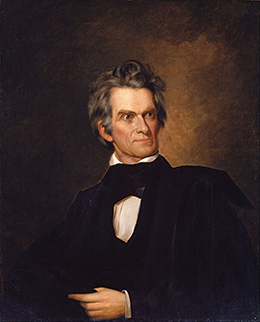| << Chapter < Page | Chapter >> Page > |
With the rise of democracy during the Jacksonian era in the 1830s, slaveholders worried about the power of the majority. If political power went to a majority that was hostile to slavery, the South—and the honor of white southerners—would be imperiled. White southerners keen on preserving the institution of slavery bristled at what they perceived to be northern attempts to deprive them of their livelihood. Powerful southerners like South Carolinian John C. Calhoun ( [link] ) highlighted laws like the Tariff of 1828 as evidence of the North’s desire to destroy the southern economy and, by extension, its culture. Such a tariff, he and others concluded, would disproportionately harm the South, which relied heavily on imports, and benefit the North, which would receive protections for its manufacturing centers. The tariff appeared to open the door for other federal initiatives, including the abolition of slavery. Because of this perceived threat to southern society, Calhoun argued that states could nullify federal laws. This belief illustrated the importance of the states’ rights argument to the southern states. It also showed slaveholders’ willingness to unite against the federal government when they believed it acted unjustly against their interests.

As the nation expanded in the 1830s and 1840s, the writings of abolitionists—a small but vocal group of northerners committed to ending slavery—reached a larger national audience. White southerners responded by putting forth arguments in defense of slavery, their way of life, and their honor. Calhoun became a leading political theorist defending slavery and the rights of the South, which he saw as containing an increasingly embattled minority. He advanced the idea of a concurrent majority , a majority of a separate region (that would otherwise be in the minority of the nation) with the power to veto or disallow legislation put forward by a hostile majority.
Calhoun’s idea of the concurrent majority found full expression in his 1850 essay “Disquisition on Government.” In this treatise, he wrote about government as a necessary means to ensure the preservation of society, since society existed to “preserve and protect our race.” If government grew hostile to society, then a concurrent majority had to take action, including forming a new government. “Disquisition on Government” advanced a profoundly anti-democratic argument. It illustrates southern leaders’ intense suspicion of democratic majorities and their ability to effect legislation that would challenge southern interests.
Go to the Internet Archive to read John C. Calhoun’s “Disquisition on Government.” Why do you think he proposed the creation of a concurrent majority?
White southerners reacted strongly to abolitionists’ attacks on slavery. In making their defense of slavery, they critiqued wage labor in the North. They argued that the Industrial Revolution had brought about a new type of slavery—wage slavery—and that this form of “slavery” was far worse than the slave labor used on southern plantations. Defenders of the institution also lashed out directly at abolitionists such as William Lloyd Garrison for daring to call into question their way of life. Indeed, Virginians cited Garrison as the instigator of Nat Turner’s 1831 rebellion.

Notification Switch
Would you like to follow the 'U.s. history' conversation and receive update notifications?